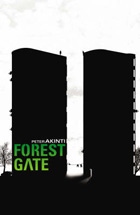This is a story about two teenage boys who try to kill themselves and what happens afterwards. Just as important, though, is what happened before they try to kill themselves. They go to the top of two adjoining tower blocks and tie nooses around their necks. Then they jump off the sides of the buildings. It's midnight. We are in outer east London. One of the boys dies instantly. His neck breaks. The other survives. He swings for a while, terrified. Then he gets his hand between the rope and his neck and he screams and someone hears him.
The person who tells us this story is Meina, the 18-year-old sister of the dead boy, who was called Ashvin. Meina and Ashvin were Somali refugees; their parents were killed, in pretty much the most brutal circumstances you can imagine. So Meina has been numbed by violence and Peter Akinti, the author, draws us into this numbness with great skill. Meina tells us that after her parents were killed, she was married six times while in her teens. Then she came to London. "Truth was, in many ways we lived better in Somalia," she says.
What can Meina possibly mean by this? How can her London be worse than the place she came from? By getting us into the heads of Meina and the two suicidal boys, Akinti manages to make us understand what she does mean; it's a feat of fiction writing that goes beyond reporting, because it's the sort of thing that reporters never, or hardly ever, tell you. Akinti tells you how appalling modern Britain can be. We keep hearing about knife crime and gang warfare, but really have no idea. Well, Akinti does. He's a Londoner of Nigerian descent. He founded the black men's magazine Untold and he writes with a sort of controlled rage - a modern-day Richard Wright.
Meina tells us her life story. The Somali scenes are very raw and brutal, particularly when she tells us how her parents died - her mother was raped several times, as her father watched, and then they were shot. She tells us about her marriages - she was little more than a teenage servant. And why is Somalia such a terrible place? There's a great scene in which we see Ashvin explaining the history of Somalia to his best friend, James. They are in a Pizza Hut in London. "The Europeans met in Berlin in the 1800s and carved Somalia into slices like pizza," he says.
Then we hear James's story. He's the boy who survived the suicide pact. He comes from a family of drug dealers; a world of "respect", of gang loyalties, of people being attacked and killed for almost no reason, of money stuffed in cushions, a cash and weapon economy where nobody feels secure, where your mum is on crack and your dad is dead, shot by a rival drug dealer. This is the world that refugees escape to.
Overshadowing the whole thing is colonial Britain, where the trouble started - and where it is being re-enacted, more than a century later, as Ethiopians and Kenyans and Somalis carve each other up on the streets of London. And there's romance - James and Meina get together. They love each other, but is there any hope for them? "I was surprised when James kissed me", Meina tells us. "I had been married six times, but before that night I had never had consensual sex." A very bleak picture indeed, and very well told.
>via: http://www.guardian.co.uk/books/2009/mar/22/forest-gate-london-books-review
______________________
Children of Exile

Illustration by Alice Stevenson
By SIMON AKAM
Published: February 25, 2010
Peter Akinti’s first novel, “Forest Gate,” is about broken bodies and a broken country. Titled after a deprived district in East London, the novel begins with a double suicide attempt: a hanging that leaves a young Somalian refugee dead and his British friend James still alive, collared with bruising, his trachea embedded with rope.
The dead man, Ashvin, has a sister, Meina; and after the absorbing violence of the opening scene, the novel slows as she and James begin a relationship. Somalia — where “people kept light to a minimum out of fear of the roaming militia” — is described in poetic flashbacks, allowing the failed state to retain a measure of beauty, without London’s constant rain and racism.
Akinti grew up in Forest Gate, and his attempt to detail the contemporary black British experience is visceral and immediate. Poverty and the schism between British-born blacks and African immigrants are both present, but most engaging is the neighborhood itself. From the slums — where desperate public housing complexes are named for pioneering African statesmen like Mandela and Nkrumah — London’s celebrated real estate is close enough to see, but distant in any real sense. The remoteness of Norman Foster’s “Gherkin” building is apparent when that turgid skyscraper, emblematic of the city’s recent boom years, is dismissed as a huge phallic symbol for the financial district.
“Forest Gate” is hot with fury; an episode relating Ashvin’s and James’s har assment and sexual abuse at the hands of the Metropolitan Police is a lesson in controlled outrage. The novel elegantly illustrates contemporary Britain’s failure to assimilate its immigrants, or to allow a hyphenated sense of identity. Akinti’s characters do not think of themselves as Somali-Britons. Instead, orphaned by the murder of their parents and cast out by their country’s failures, Ashvin and Meina find that “the streets of London were carved out into territories just as they had been at home.”
Akinti opens “Forest Gate” with an epigraph from James Baldwin, and the book is littered with references to him. But the British black experience doesn’t always overlap neatly with the American one. In a telling scene, James recalls traveling to central, prosperous London and watching the barristers — the wig-wearing courtroom practitioners of Britain’s legal system. By the Royal Courts of Justice, James spots a smartly dressed black man clutching The Financial Times, his cuffs monogrammed, his face “scared,” James thinks, “like he knew he was one false move away from the street.”
This fear might make sense for Baldwin’s American characters, but it doesn’t for Akinti’s upper-class British barrister. Without a doubt there are feudal absurdities to British society — its accents are like barcodes, rife with data on birth and education that the native ear can decipher. But one advantage of a country that fractures so dependably on class lines is that it tends not to on racial ones: a black man with the trappings of privilege can be secure in that privilege. Akinti, borrowing American rhetoric, fails to acknowledge that calcified Britain allows an alternative route to racial acceptance precisely because of the importance attached to things like pronunciation and monogrammed cuffs.
There are other weaknesses here too, notably the insufficient differentiation among the various characters who tell much of the story in the first person. Meina’s middle-aged white guardian, thinking about the nature of black manhood, sounds surprisingly like his teenage Somali ward. Still, Akinti has acquitted himself with substantial élan and transformed a grim place into a thing of beauty.
Simon Akam has written for The Times Literary Supplement, The Guardian of London and The New York Times.
>via: http://www.nytimes.com/2010/02/28/books/review/Akam-t.html






